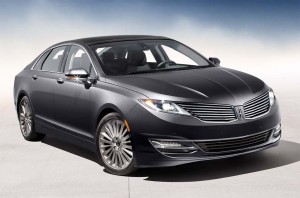Ford Motor Co. will more than double the production of the hybrid version of its Lincoln MKZ luxury sedan for the 2014 model-year, the maker says, reflecting an unexpected surge in demand for the high-mileage option.
After a slow start, the MKZ has been gaining traction in recent months, particularly in West Coast markets where domestic luxury brands have traditionally had trouble gaining momentum. Company officials credit the availability of the Lincoln hybrid as one of the factors in that sales growth.
Calling the demand for the Lincoln MKZ Hybrid “compelling,” Ford global product czar Raj Nair noted that the gas-electric version of the luxury sedan has a “turn rate,” the time it actually sites on a dealer lot, of barely 12 days nationally, and just 10 days in Los Angeles.
That’s less than a quarter of the turn rate of the typical vehicle – though the numbers may be skewed by the slow ramp-up of MKZ production that has left dealers around the country in generally short supply of the sedan. But company officials insist that production of the new Lincoln model is now up to a normal rate.
Going into the roll-out of the 2013 MKZ, Lincoln originally anticipated the hybrid version would account for about 20% of total sales, and over the past quarter, it generated just over 700 sales a month out of around 3,900 for the MKZ overall. But potential buyers have been clamoring for more.
As a result, Lincoln will equip 40% of the MKZ sedans built during the 2014 model-year with the hybrid powertrain. And since the maker expects overall demand for the luxury model to rise, that would mean sales of the MKZ Hybrid could actually more than double next year.
Hybrid sales have generally been growing, albeit at a moderate pace. They still account for less than 4% of the overall U.S. new vehicle market. But with a number of new battery-based vehicles coming next year, proponents anticipate that will grow.
It could also chip into the long-running dominance of the Toyota Prius which has, for the last decade, routinely accounted for more than half of all U.S. hybrid sales. Significantly, Ford sold 46,000 battery-based vehicles during the first half of 2013 – a figure that includes plug-ins like the Fusion Energi, as well as the Focus EV – giving it a 15.7% share of the segment, according to the maker’s data. That was a 12% jump over the same period a year earlier. Notably, the Prius experienced a 5% sales decline during the first half.
(Automakers race flood of new hybrids to market. Click Here for more.)
One of the factors that has helped Ford has been the decision to offer the gas-electric version of the Lincoln MKZ for the same price as the conventional, gas-powered model. Typically, hybrids carry a substantial price premium.
While Ford officials put an emphasis on the growing demand for their battery-based vehicles, a news conference at the company’s product development center also highlighted a problem the Michigan maker is facing.
Ford has taken some sharp criticism for the mileage delivered by its current hybrid models under real world conditions – which can lag by as much as 21% behind the EPA-certified ratings for the vehicles, according to Consumer Reports magazine tests. That has resulted in several lawsuits.
(For more on Ford’s fix for its hybrid mileage issue, Click Here.)
While Ford isn’t the only maker to experience what product chief Nair called “variability,” it plans to take steps to deal with the problem. The maker will make a number of software updates to 2014 models, such as the Lincoln MKZ Hybrid designed to improve real-world fuel economy, and it also will offer existing customers a free software upgrade. Notices will go out over the coming weeks to 77,000 hybrid owners.
(Ford facing lawsuits over mileage claims. Click Here.)


They have to do something to cover up the fact that the Lincoln product line is a failure.
A complete family of Edsels.
CA is the land of perceived “green”. It’s no surprise that they buy hybrids and EVs in disporportionate quantities to the rest of the world.